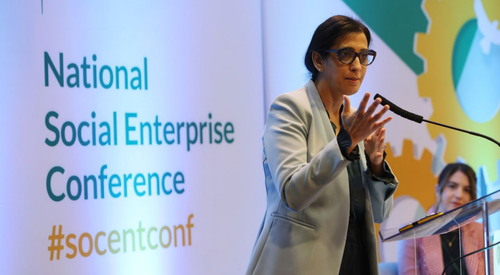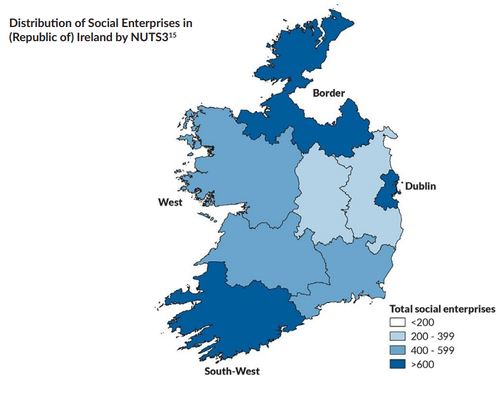
On July 24th, 2024 Ireland’s second national social enterprise policy was launched by Minister for Rural and Community Development Heather Humphreys T.D. This strategy is called Trading for Impact: National Social Enterprise Policy 2024 -2027.
In the Minister’s press release, it states that “The purpose of the policy is to help cultivate and sustain strong and impactful social enterprises in Ireland to enrich the social, environmental, and economic well-being of people living in our communities. The policy represents a strong commitment by Government to social enterprises and a recognition of their value and potential.”
Trading for Impact contains five policy objectives and fifty-seven actions. In this article we will highlight a number of actions under each objective.
- Building Awareness of Social Enterprise
Under Action 9, the last of the actions under this objective, it states “Following the 2023 publication of a National Strategic Framework for Lifelong Guidance, post primary guidance will be strengthened over the short, medium and longer term. This will support continued provision of information relating to social innovation and Guidance in post primary schools.”
The focus of this action has to be broader than post primary schools. It would be critical that under a framework on lifelong guidance that building an awareness of social enterprise engages with the full range of education and training provision.
- Growing and Sustaining Social Enterprise
There are twenty-five actions under this policy objective including:
- Action 10: Provide a website to act as a central source of supports for social enterprises, and include an annual calendar of DRCD funding and supports to allow for improved planning and predictability for social enterprises.
- Action 12: Over the lifetime of this policy, deliver loan / grant funding schemes for social enterprises, and provide targeted supports through new and existing programmes including CSP, SICAP, PEACEPLUS, and LEADER.
- Action 14: Funding and support will be provided for social enterprises through active labour market programmes including the Community Employment scheme, Tús, and the Rural Social Scheme.
- Action 25: New public procurement guidance will be developed and information briefings provided for public procurement officers and social enterprises.
- Action 31: Research detailing best international practice on socially responsible public procurement and ‘Buy Social’ will be published.
- Action 34: Investigate the challenges and merits of utilising a dedicated administrative voluntary accreditation or ‘quality mark’ for social enterprises.
- Supporting the Green Transition
There are four actions under this heading including:
- Action 35: Ensure that social enterprises are considered in the range of existing and new measures and supports to help in the delivery of Government climate action targets.
- Action 36: Negotiate at an EU level to include recognition of, and a dedicated role for, social enterprises in the proposal to amend the Waste Framework Directive.
- National and International Engagement
There are twelve actions under this heading including:
- Action 40: Regional Enterprise Plan Steering Committees will consider the inclusion of any appropriate measures within the next cycle of plans to support the development of social enterprises.
- Action 42: Local Community Development Committees will have regard to the needs of social enterprise when developing their Local Economic and Community Plans.
- Action 43: Deliver increased opportunities for knowledge sharing and networking on an all-island basis including through the organisation of an all-island social enterprise conference.
- Action 48: Participate on the OECD Informal Expert Group on the Social and Solidarity Economy and Social Innovation.
It is important to note that the terms / concepts social and solidarity economy are broader than social enterprises. According to the OECD “Social economy, also referred to in some countries as solidarity economy and/or social and solidarity economy, is made up of a set of organisations such as associations, cooperatives, mutual organisations, foundations, and, more recently, social enterprises. In some cases, community-based, grassroots and spontaneous initiatives are part of the social economy in addition to non-profit organisations, the latter group often being referred to as the solidarity economy. The activity of these entities is typically driven by societal objectives, values of solidarity, the primacy of people over capital and, in most cases, by democratic and participative governance.”

- Impact Measurement
There are seven actions under this heading including:
- Action 52: Make available social impact measurement best practices, and capacity building supports to social enterprises.
- Action 53: Undertake research to better understand the potential or actual contribution / impact made by social enterprises in delivering on green transition / climate action targets.
- Action 56: Establish a Trading for Impact Stakeholder Engagement Group to co-ordinate input into the delivery of the policy, to meet bi-annually.